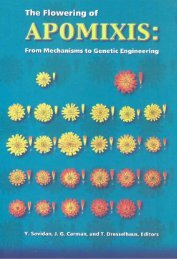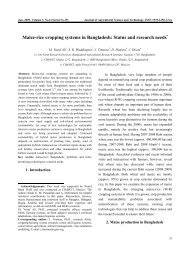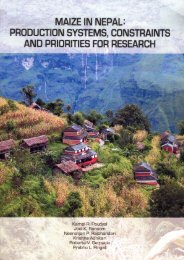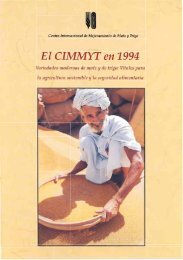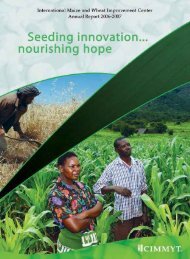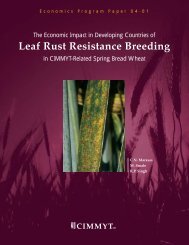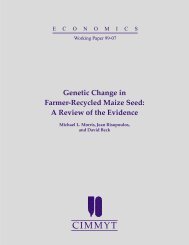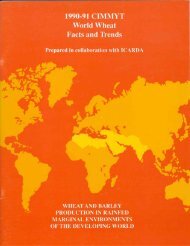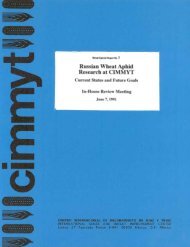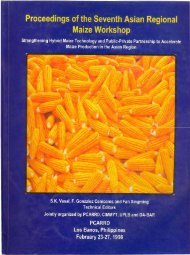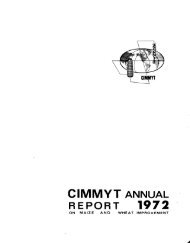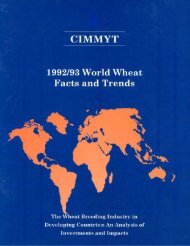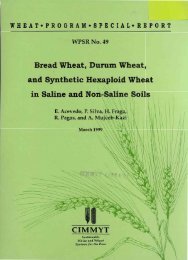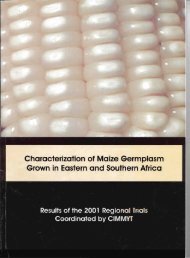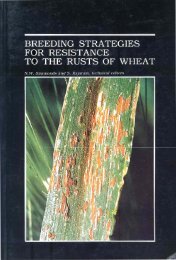Download - Maize
Download - Maize
Download - Maize
Create successful ePaper yourself
Turn your PDF publications into a flip-book with our unique Google optimized e-Paper software.
Research and development partners<br />
CIMMYT and IITA have established collaborative germplasm development for drought and N stress,<br />
mostly with national research systems in sub‐Saharan Africa, and CIMMYT has supported emerging<br />
efforts in Asia. This network needs to be strengthened, particularly in Asia where increasing yield levels<br />
and climate change greatly amplify production variations due to drought and heat, and for poverty<br />
pockets in Central America. Research collaboration will be sought with multinational seed companies<br />
and biotechnology organizations (building on successful collaboration with Monsanto, Syngenta, AATF<br />
and Pioneer) and advanced research institutes including those in the developing world (Brazil, China,<br />
India, Mexico) for positional cloning of relevant native‐trait alleles and transgene sourcing and<br />
deployment. The basic requirements for engaging in transgenic trait research include: (1) royalty‐free<br />
access for farmers in low and lower‐middle income countries (or a significant number of such countries);<br />
(2) proof of concept for relevant (>10%) yield increases at the field level in maize or other crops; (3) a<br />
feasible deregulation strategy.<br />
These partners include the wider range of national research systems, local seed companies, NGOs, and<br />
community‐based organizations in drought affected countries in Africa, Asia, and Latin America, for local<br />
variety adaptation/selection, release, and scale‐out to farmers in stress‐prone environments. More<br />
effective interactions need to be built with development partners engaged with farming families and<br />
communities that do not receive adequate services—either from the private or the public sector—and<br />
have limited access to markets because of poverty and lack of political influence.<br />
Outcomes<br />
Sufficient production increases in stress‐prone environments to allow farmers to escape the poverty<br />
trap of recurrent failed harvests and enable them to obtain reliable returns on investments in seed,<br />
fertilizer, land and labor.<br />
Increased diffusion of improved technologies in stress‐prone environments, to the benefit of<br />
farmers and local entrepreneurs.<br />
Reduced variation in maize production and more stable grain prices.<br />
Key milestones<br />
2011: Research collaborations formalized and collaborative breeding/variety testing networks<br />
extended to include as a minimum:<br />
Africa: six drought phenotyping sites, six N stress phenotyping sites, one heat phenotyping<br />
site, one acid soil phenotyping site.<br />
Asia: four drought phenotyping sites, two heat phenotyping sites, three waterlogging<br />
phenotyping sites. Tolerance to combined heat plus drought, and waterlogging plus<br />
drought, will be evaluated in at least one site for each combination.<br />
Latin America: two drought phenotyping sites, two N stress phenotyping sites, one acid soil<br />
phenotyping site. Tolerance to heat plus drought will be evaluated in at least one site.<br />
Disease and insect pest phenotyping hubs established in key countries in East and West<br />
Africa, and in Asia<br />
2011: Target regions with the greatest potential return to investment in drought/heat tolerance<br />
breeding defined, based on available GIS data.<br />
2011: Standard biotic stress screening protocols developed and shared with partners.<br />
2012: Stress tolerant donors identified from existing databases and confirmed in phenotypic<br />
screening. Information made available on the internet and seed availability ensured.<br />
2012: Managed stress screening sites operational and research staff trained in common protocols.<br />
112



